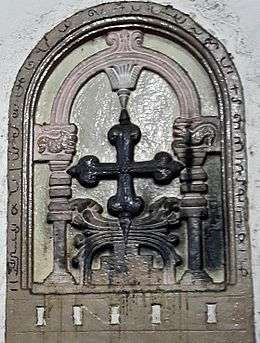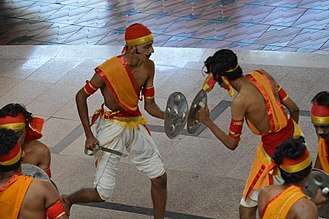Parichamuttukali
Parichamuttu Kali ([Malayalam]: പരിചമുട്ട്കളി ) is an Indian martial-arts dance form of Kerala practiced by the Nazrani Christians who trace their origins to the evangelistic activity of Thomas the Apostle in the 1st century.[1][2] It is performed by men bearing swords and shields and follows the movements and steps of Kalarippayattu.
| Part of a series on |
| Saint Thomas Christians |
|---|
 |
| History |
| Saint Thomas · Thomas of Cana · Mar Sabor and Mar Proth · Tharisapalli plates · Synod of Diamper · Coonan Cross Oath |
| Religion |
| Crosses · Denominations · Churches · Syriac language · Music |
| Prominent persons |
| Abraham Malpan · Paremmakkal Thoma Kathanar · Kayamkulam Philipose Ramban · Saint Kuriakose Elias Chavara · Varghese Payyappilly Palakkappilly · Mar Thoma I · Saint Alphonsa · Sadhu Kochoonju Upadesi · Kariattil Mar Ousep · Geevarghese Dionysius of Vattasseril · Geevarghese Mar Gregorios of Parumala · Geevarghese Ivanios · Euphrasia Eluvathingal · Thoma of Villarvattom |
| Culture |
|
Margamkali · Parichamuttukali · Cuisine · Suriyani Malayalam |

History
The origin of the art can be traced back to ancient days when Kalarippayattu, a martial art of Kerala, was in vogue.[3]
Performance
The dancers are usually dressed in a white loin cloth with red wrist bands and sing in chorus as they dance. The performers dance with sword and shield on their hands. The group is usually headed by a leader called Asan around whom the rest of the dancers perform.[4] The dance used to be performed as a religious offering but is nowadays gaining popularity as a Syrian Christian entertainment art.
Current situation
Currently both Parichamuttukali and Margamkali are included in the State Youth Festival of Kerala. This makes these art forms a competitive item in the Four-tier system (i.e. School, Sub District, Revenue and State level) Youth festival.[2]
See also
References
- "Parichamuttukali". Kerala Tourism.
- "Margam Kali – History, Text, Lyrics, Theme, Early Reference and Modern Developments". 4 May 2009.
- "Archived copy". Archived from the original on 27 August 2014. Retrieved 31 October 2014.CS1 maint: archived copy as title (link)
- "Archived copy". Archived from the original on 31 October 2014. Retrieved 31 October 2014.CS1 maint: archived copy as title (link)